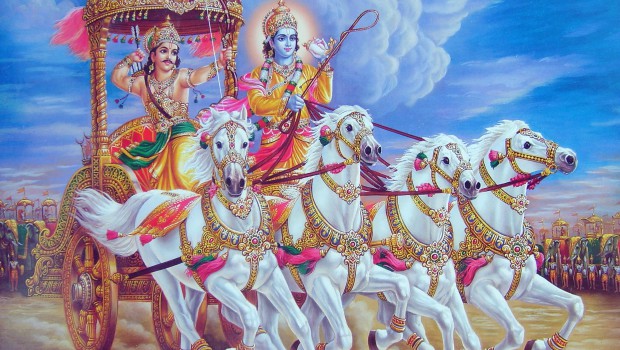Krishna The Archetypal Mentor
The choice of Krishna as the ideal mentor is due to the fact that Krishna performed multiple roles and had numerous mentoring styles. He was leader, manager, negotiator, manipulator, motivator, influencer, all rolled into one. An account of his mentorship would therefore enable us see the diverse styles of mentoring that are needed for diverse situations.
The mentoring relationship is one that has become the subject of many business myths. Differences in mentoring styles are galore and there is no one mentoring style that is suited for all occasions. It is essential therefore to first understand what is mentoring and then see the different facets of mentoring in a mentoring relationship. Mentoring, is the process by which people help a protege to promote the protege’s personal and professional growth for organisational success. Mentoring is routinely seen as manifesting soft skills such as the classical virtues of kindness and generosity. The fact that it can also be harsh seems to escape the mind of most theorists. Therefore an account of a real mentoring relationship, one that is widely recognised and one in which various mentoring styles are manifested, becomes necessary.
In the Indian context the most successful mentoring relationship is the one between Krishna and Arjuna. Religious preachings and the fantastic mythical details have made it difficult to analyse this relationship and separate fact from fiction. The famous depth psychologist, Carl Jung held the opinion that myths were a guide that enabled a person journey to wholeness. The fantastic details encountered in myths had to be sifted through to get to the core message. Using this perspective we can strip away the divinity associated with Krishna so that we get a picture of the real Krishna and his relationship with Arjuna.
The choice of Krishna as the ideal mentor is due to the fact that Krishna performed multiple roles and had numerous mentoring styles. He was leader, manager, negotiator, manipulator, motivator, influencer, all rolled into one. An account of his mentorship would therefore enable us see the diverse styles of mentoring that are needed for diverse situations.
Arjuna was the individual on whose shoulders the morale of Pandavas rested. His well being heralded victory and he was symbolic of Pandava valour & glory. He was proud of his achievements, but he was also very vain and sensitive to other people’s opinion of him. Though a younger brother, he had no elder brother to look up to. In fact, he was responsible for looking after the family since Yudhishthira, the eldest was unable to do so. Thus, he had varied needs as an individual. Krishna saw the needs as well as the potential of his young friend and built a successful mentoring relationship. As the account of not just the war but the entire Pandava saga shows, Krishna’s help would enable Arjuna to surmount obstacles and achieve success personally as well as professionally i.e in his duties as a warrior and a prince.
What lessons of mentoring may be learned from their relationship? How was he able to provide support and guidance to an individual whose needs were so diverse and so intense?
- Show support in word and deed-Building trust
Krishna proclaimed his love for Arjuna publicly and made it clear that he attached the highest importance to his friendship with Arjuna. They spent much time together and Krishna took every opportunity to demonstrate his affection for Arjuna. One of the best examples of this is found in the incident of the burning of the khandav forest . To please Agni, Krishna and Arjuna fought Indra and the devas and defeated them. Pleased with their valour, Indra offered boons to both of them. While Arjuna asked for weapons, Krishna asked that his friendship with Arjuna continue forever. The mythical dimensions of this story notwithstanding, it makes Krishna’s fondness for Arjuna very clear. The basis of mentorship lies in being publicly supportive and standing by your protege. The first step to mentoring is building trust. - Constant support without interference-building self confidence
Krishna was always supportive of Arjuna but he never interfered in Arjuna’s life. He confined his role to providing advice. At no point do we see Krishna commanding Arjuna to take decisions or actions chosen by him. Arjuna had a fragile psyche and he would not have tolerated anyone telling him what to do. Furthermore, it was necessary that Arjuna build confidence in himself. Then only would he be able to take his own decisions. Thus, not only did Krishna not interfere, but he saw to it that Arjuna did not unduly depend upon him-a constant danger in a mentoring relationship. - A relationship of fun and cheer-building openness and warmth
Krishna’s relationship with Arjuna was not a grim one. Krishna’s penchant for pranks is well known and that ensured that the relationship would have been a warm one with a laughter and cheer. Arjuna with his multiple roles and responsibilities took himself too seriously leading to outbursts and displays of temper. A lighthearted relationship ensured that Arjuna was able to view his own actions more objectively. Krishna also ensured that stress was reduced and Arjuna was able to feel confident about Krishna’s interest in him. A mentor usually has the mentee in awe of him. Unless mentors show themselves to be comrades, it is impossible for the mentees to open up to them. - Provide criticism without denigrating the protege-have a nonjudgemental attitude
Krishna criticised Arjuna’s decisions openly but never denigrated or insulted him. Krishna focused on the issues involved without being judgemental. He did not engage in personal humiliation of Arjuna. Arjuna therefore knew that Krishna would provide him with sound advice and not be swayed by the fear of negatively affecting their relationship. - Support protege in difficult tasks despite reservations-give unconditional support
Krishna often criticised Arjuna for wrong decisions but he never left Arjuna to fend for himself and reap the consequences of those decisions. When Abhimanyu was killed and Arjuna took a vow that he would either kill Jayadrath by the evening or commit suicide, Krishna was very critical but put heart and soul into assisting Arjuna to achieve his goal. Thus, standing by your protege against all odds even your own disagreement with his decision helps build the mentor-mentee relationship. - Help protege to make decisions in times of personal crisis-personal counseling
Krishna was friend cum counselor to Arjuna and took the time out to help resolve Arjuna’s personal distress. When Arjuna faced a moral crisis in fighting his relatives, Krishna came to the rescue by propounding the philosophy enshrined in the Gita. He did not resort to a simplistic command tactic, but made the effort to resolve Arjuna’s moral distress to the best of his ability. - Search for ways to enable the protege become aware of his limitations-encourage self awareness
There are tales of Krishna destroying Arjuna’s vanity. This was never done openly. The tales talk of tests in which he was destined to fail. At the last moment when a dejected Arjuna would be lonely and depressed and thinking of committing suicide, Krishna would appear and tell him the reason for these tests. These tests were related to Arjuna’s overblown pride in his prowess as an archer. Following these tests, a chastened Arjuna vanquished his vanity and worked towards setting higher standards and viewing failure with maturity.
These are seven cardinal principles that can enable a successful mentoring relationship. Techniques and tactics for putting these into effect may differ, but as Stephen Covey puts it, it is important to be clear about principles.
The question then arises as to whether the same relationship can be built today. This is possible if one makes it a personal goal to be a complete mentor and emulate the multiple styles of Krishna. The other means is to select a role that one is comfortable with & can excel in and provide mentoring support to those that need it . That choice is ours.
Graphic Done By Himani














